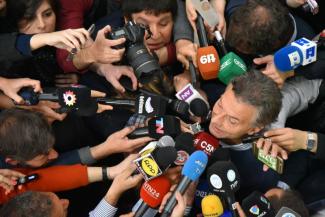Elections
Democratic shift to the right

The Argentine daily „Página/12“ recently published a cartoon which was quite telling. A staff member asks the newly elected President Mauricio Macri: „Who shall we now blame for everything?“ Macri answers: „Cristina of course, as always!“ His staffer objects: „But she’s gone...“, and Macri retorts: „Have you never heard about retroaction?“
For twelve years, the opposition was used to blaming the Kirchners for each and every problem – first Néstor Kirchner, then his wife Cristina Fernández de Kirchner, his successor as president. The Kirchners made the country veer to the left. They belonged to the same Peronist party that pushed radical free-market policies in the 1990s, but they belonged to its left wing. One decision with great symbolic importance was partly renationalising the petrol company YPF, which had been privatised in the 1990s. This step infuriated Argentina’s oligarchy, to which the Macri family belongs.
For a long time, the new president was only known as „the son of“ Franco Macri, a very rich industrialist. Macri senior acquired a large part of his assets with public contracts – during the military dictatorship. His son Mauricio first made a name for himself as president of football club Boca Juniors. That was almost a rebellion, since Boca is known as a working class club.
From football Mauricio turned to politics. His party Propuesta Republicana (PRO) unites conservative politicians und independent businessmen who don’t feel represented by the traditional parties. As its candidate, Macri was twice elected mayor of Buenos Aires – and now president.
The Latin American left reads his election as part of an international trend towards conservative restoration. For more than a decade, mostly socialist and social-democrat governments had been ruling the continent. Three years ago, Paraguay’s military toppled left-wing President Fernando Lugo. Currently, Brazil’s President Dilma Rousseff must face impeachment proceedings, and the long dominant leftist party of Venezuela lost the parliamentary elections in December.
Macri has declared that he – contrary to his predecessor – will not support the left-wing governments of Ecuador, Bolivia and Cuba. Moreover, he wants Venezuela to be excluded from the economic alliance Mercosur. Argentina cannot decide this on its own, but Macri’s stance has great symbolic relevance. It shows that the stable political alliances of the past decade are tottering.
It is healthy that, for the first time in Argentina’s history, right-wing groups have come to power in elections. Formerly, they had only grabbed power in coups. Commentators of the entire political spectrum rate the election result as a sign of strengthened democracy.
Macri presents himself as a strict free-market advocate. Consequently, many people fear the return of the radical free-market policies of the 1990s, which ended in a catastrophic financial crisis. The result was widespread poverty, which the Kirchners then fought with various social programmes. This approach secured them a solid electoral base amongst the socially deprived.
An important and quite effective measure, for example, was Cristina Kirchner’s introduction of a family allowance for unemployed parents or those who work in the informal sector. To get money, they must only prove that their children are vaccinated and attending school.
In the past few years, however, the facts that Néstor Kirchner managed to stabilise the economy after the crisis and the leftist social policies reduced poverty were forgotten. Allegations of corruption were voiced. The high inflation dominated the public discourse. The press complained – correctly – about the ruling party’s tendency to manipulate the media.
Now, Argentinians expect a lot from their new president – too much: he is supposed to boost the economy, attract investors to the country and at the same time maintain social achievements. Argentinians voted for a change, but they widely disagree about which direction to go.
Sheila Mysorekar is a member of D+C/E+Z’s editorial team.
euz.editor@fs-medien.de








